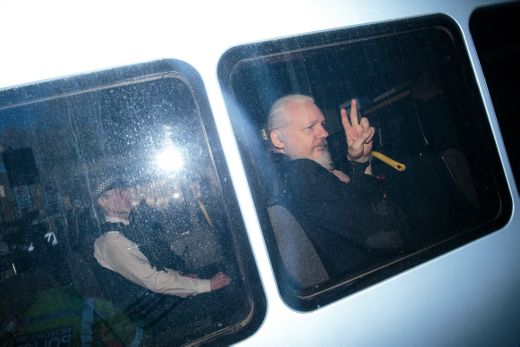WikiLeaks Founder Julian Assange Arrested In London To Face Hacking Conspiracy Charge In The US

WASHINGTON – After seven years of self-imposed exile, WikiLeaks founder Julian Assange was arrested inside the embassy of Ecuador in London Thursday on charges of conspiring to hack government computers in what prosecutors called the largest compromise of classified information in U.S. history.
Assange, 47, was arrested Thursday by authorities in the United Kingdom to be extradited to the United States.
The charges against Assange, revealed Thursday morning, alleged that he engaged in a conspiracy with Chelsea Manning, a former intelligence analyst in the U.S. Army, to assist Manning in cracking a password for Defense Department computers.
The computers were connected to the Secret Internet Protocol Network, which was used for classified documents and communications, prosecutors said. Manning, who had access to the computers in connection with her duties as an intelligence analyst, was using the computers to download classified records to transmit to WikiLeaks, according to the department.
Cracking the password would have allowed Manning to log on to the computers under a username that did not belong to her, prosecutors alleged.
During the conspiracy, Manning and Assange engaged in real-time discussions regarding Manning’s transmission of classified records to Assange,according to the department. Manning told Assange that “after this upload, that’s all I really have got left” the department said. Assange replied, “curious eyes never run dry in my experience,” the department said.
Assange is charged with conspiracy to commit computer intrusion. He faces a maximum penalty of five years in prison if convicted, but actual sentences are typically less than the maximum.
Barry Pollack, a U.S. lawyer for Assange, criticized the arrest and said Assange would need medical treatment that had been denied for seven years.
“It is bitterly disappointing that a country would allow someone to whom it has extended citizenship and asylum to be arrested in its embassy,” Pollack said.”
Once his health care needs have been addressed, the UK courts will need to resolve what appears to be an unprecedented effort by the United States seeking to extradite a foreign journalist to face criminal charges for publishing truthful information.
Metropolitan Police moved in after Ecuador formally withdrew its asylum for Assange, an Australian native, and subsequently revoked his Ecuadorian citizenship.
The arrest followed months of carefully orchestrated diplomatic maneuvering by the Ecuadorian government that had long soured on its relationship with Assange.
In a videotaped statement, Ecuadorian president Lenin Moreno said his country’s patience for his behavior “has reached its limit.”
Moreno described it as a “sovereign decision” due to “repeated violations to international conventions and daily life.”
He cited Assange’s bizarre behavior inside the embassy as well as his alleged violations of Ecuador’s demand that he refrain from interference in the affairs of other states, particularly in the alleged leaking of Vatican documents in January.
After his arrest, his attorney, Jennifer Robinson, tweeted that Assange had been arrested on an extradition request from the U.S., not just for breach of the British warrant.
The U.S. Department of Justice inadvertently revealed the existence of a sealed criminal case against Assange in a court filing last year. It’s not clear what he’s been accused of.
Separately, he has been under U.S. Justice Department scrutiny for years for WikiLeaks’ role in publishing thousands of government secrets.
WikiLeaks, the transparency group that he founded, was also front and center of the 2016 U.S. presidential election for leaking emails from the Democratic National Committee.
During the presidential campaign, then-candidate Donald Trump repeatedly praised the organization, saying numerous times at rallies, “I love WikiLeaks.”
Moreno, the Ecuadorian president, did not specifically confirm that Assange would be extradited to the U.S., saying only that he “will not be extradited to a country where he could suffer torture or the death penalty. ” He said the British government confirmed that in writing.
In a list of grievances, Moreno said Assange had installed prohibited electronic equipment in the embassy, blocked security cameras and even “accessed the security files of our embassy without permission.” He said Assange also had “confronted and mistreated the diplomatic guards.”
British Foreign Secretary Jeremy Hunt told reporters Thursday that the arrest shows that “no one is above the law.”
“Julian Assange is no hero,” he said. Hunt said the operation came after “years of careful diplomacy” and praised Moreno for his “very courageous decision.”
“It’s not so much Julian Assange being held hostage in the Ecuadorian Embassy,” Hunt said, “it’s actually Julian Assange holding the Ecuadorian Embassy hostage in a situation that was absolutely intolerable for them.”
Assange, an Australian national, chose to remain in the embassy out of fear that the United States would immediately seek his arrest and extradition over the leaking of classified documents to WikiLeaks by then-U.S. Army soldier Chelsea Manning.
Wikileaks said in a Thursday tweet that “Powerful actors, including CIA, are engaged in a sophisticated effort to dehumanize, delegitimize and imprison him.”
By Sean Rossman, Doug Stanglin and Bart Jansen
This article was originally published by “USA Today“
The 21st Century
